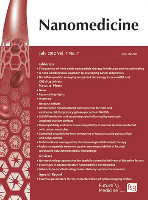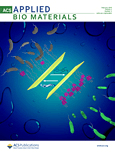
VIEW
Scope & Guideline
Advancing the Future of Biomaterials and Biomedical Engineering.
Introduction
Aims and Scopes
- Biomolecular Imaging Techniques:
The journal highlights advancements in imaging technologies such as optical, photoacoustic, and nuclear medicine imaging, which are pivotal in diagnosing and understanding various diseases. - Nanotechnology and Nanomedicine:
A core focus on the application of nanotechnology in medicine, including drug delivery systems, biosensors, and theranostic platforms that enhance treatment efficacy and diagnostic accuracy. - Artificial Intelligence in Biomedical Research:
Incorporating AI and machine learning approaches to improve diagnostic processes, predict treatment outcomes, and analyze complex biological data is a significant theme in the journal. - Extracellular Vesicles and Cell Communication:
Research on exosomes and other extracellular vesicles is emphasized, particularly their roles in intercellular communication and potential therapeutic applications in various diseases. - Microfluidics and Point-of-Care Diagnostics:
The journal covers innovations in microfluidic devices for rapid diagnostics and biomarker detection, facilitating timely clinical decision-making. - Tissue Engineering and Regenerative Medicine:
Exploration of biomaterials and scaffolds for tissue regeneration and engineering, focusing on the integration of biological and synthetic materials.
Trending and Emerging
- Integration of AI and Machine Learning in Diagnostics:
There is a growing trend towards utilizing AI and machine learning to enhance diagnostic accuracy, particularly in imaging and biomarker identification. - Advancements in Non-invasive Imaging Techniques:
Recent publications emphasize the development of non-invasive imaging modalities, including enhanced fluorescence and photoacoustic imaging, which are crucial for real-time monitoring of diseases. - Focus on Personalized Medicine:
Research on personalized therapeutic strategies, particularly in cancer treatment, is gaining traction, highlighting the importance of tailored approaches based on individual patient profiles. - Development of Smart Biomaterials:
Emerging interest in smart biomaterials that respond to biological stimuli for therapeutic applications is evident, showcasing innovation in tissue engineering and drug delivery. - Exploration of Microbiome Interactions:
An increased focus on the role of the microbiome in health and disease is emerging, particularly its interactions with cancer and immune responses.
Declining or Waning
- Traditional Drug Development Approaches:
There has been a noticeable reduction in publications focusing on conventional pharmaceutical approaches, likely due to the rising interest in personalized medicine and nanotechnology. - Invasive Diagnostic Techniques:
Papers related to invasive diagnostic methods are becoming less frequent, as non-invasive techniques gain prominence due to their patient-friendly nature and technological advancements. - Basic Research without Clinical Application:
Research that does not translate into clinical applications or therapies is waning, as the journal increasingly favors studies with direct implications for patient care.
Similar Journals

Bioengineering-Basel
Driving Excellence in Bioengineering ResearchBioengineering-Basel, an esteemed journal published by MDPI, stands at the forefront of innovation in the field of bioengineering since its inception in 2014. With an E-ISSN of 2306-5354, this fully Open Access journal based in Switzerland provides a platform for researchers and professionals to disseminate cutting-edge findings across various aspects of bioengineering, including biomaterials, tissue engineering, and biopharmaceuticals. The journal has been recognized with a Q3 ranking in the 2023 Bioengineering category, reflecting its commitment to quality and relevance. By facilitating widespread accessibility to academic knowledge, Bioengineering-Basel aims to foster collaboration and stimulate thought leadership within the global research community, making it an indispensable resource for students, scholars, and industry practitioners alike.

Nature Biomedical Engineering
Transforming Healthcare Through Engineering ExcellenceNature Biomedical Engineering is a premier journal published by NATURE PORTFOLIO, focusing on innovative research at the intersection of engineering and biomedical sciences. With an ISSN of 2157-846X, this journal aims to disseminate groundbreaking studies that advance the field of bioengineering, biotechnology, and medical applications. Since its inception in 2017, it has rapidly earned a reputation for excellence, consistently achieving a Q1 ranking in various categories including Bioengineering and Biomedical Engineering, and receiving acclaim in prestigious Scopus rankings, boasting top positions in the fields of Computer Science Applications and Medicine. The journal operates under a rigorous peer-review process, ensuring that all published articles contribute substantially to the existing body of knowledge. Furthermore, it facilitates a broad accessibility model for researchers and practitioners, bolstering collaboration and innovation within the global scientific community. Nature Biomedical Engineering is not just a publication; it serves as a vital platform for thought leadership in the transformative field of biomedical engineering.

Biomedical Engineering-Biomedizinische Technik
Bridging Disciplines for Revolutionary Biomedical SolutionsBiomedical Engineering-Biomedizinische Technik, published by WALTER DE GRUYTER GMBH, serves as a pivotal platform for advancing knowledge in the field of biomedical engineering and medicine since its inception in 1956. With an ISSN of 0013-5585 and an E-ISSN of 1862-278X, this peer-reviewed journal offers accessible insights into innovative research and technological advancements that are reshaping healthcare practices and biomedical applications. Although rated in the Q3 category for both Biomedical Engineering and Miscellaneous Medicine in 2023, the journal's impact factor and growing reputation demonstrate its vital role in fostering academic dialogue and collaboration. The journal is based in Germany, while its scope encompasses a diverse range of topics, thus bridging the gap between engineering and medical disciplines. Researchers, professionals, and students alike are encouraged to engage with the content that not only highlights contemporary challenges but also presents groundbreaking solutions in biomedical technology.

BIOMEDICAL MICRODEVICES
Innovating Health Solutions Through MicrotechnologyBIOMEDICAL MICRODEVICES is a leading journal published by Springer that focuses on the innovative field of microdevices within biomedical engineering. With an ISSN of 1387-2176 and an E-ISSN of 1572-8781, BIOMEDICAL MICRODEVICES offers a prestigious platform for researchers to disseminate their findings from 1998 to 2024, demonstrating a long-standing commitment to advancing knowledge in this critical area. The journal is recognized for its significant contributions, boasting a Q2 ranking in Biomedical Engineering and Nanoscience and Nanotechnology, and a Q3 rank in Molecular Biology. Renowned for its rigorous peer-review process, it is positioned within the top 30% of its field according to Scopus rankings, making it a valuable resource for researchers and practitioners alike. Though it operates under a subscription model, the emphasis on quality and relevance within its scope ensures that BIOMEDICAL MICRODEVICES remains a vital source of cutting-edge research that bridges engineering and biological systems, fostering innovation and collaboration in the pursuit of novel health solutions.

Nanomedicine
Advancing the Future of Medicine through NanotechnologyNanomedicine, published by Future Medicine Ltd, is a premier academic journal dedicated to the rapidly evolving field of nanotechnology in medicine. With an emphasis on innovative research and applications, this journal encompasses a broad spectrum of topics including bioengineering, biomedical engineering, and nanoscience, among others. Featuring an impressive Q1 ranking in Development and multiple Q2 rankings across significant categories, it serves as a pivotal resource for researchers and professionals aiming to stay at the forefront of advancements in these disciplines. While the journal is not open access, it is accessible through various institutional subscriptions, ensuring wide dissemination of cutting-edge findings. Notably, it has achieved substantial impact within the scientific community, indicated by its high rankings in Scopus and overall commitment to enhancing the understanding and application of nanomedicine. This journal is a vital conduit for fostering collaborations and innovations that transcend traditional medical paradigms.

Biomaterials Advances
Elevating Biomaterials Science for a Healthier TomorrowBiomaterials Advances is a premier journal published by Elsevier, dedicated to the rapidly evolving field of biomaterials. Established in the United Kingdom, this open-access journal aims to disseminate high-quality, peer-reviewed research that explores innovative biomaterial designs and their applications in bioengineering and biomedical engineering. With an impressive 2023 impact factor reflected in its Q1 rankings across multiple categories—including Bioengineering, Biomaterials, and Biomedical Engineering—Biomaterials Advances stands out as a critical platform for scholars and practitioners faced with advancing technologies and methodologies in the realm of materials science. Covering a broad range of topics, from biocompatibility to tissue engineering, this journal provides an inclusive forum for researchers seeking to contribute to the field. Its Scopus rankings further affirm its position as a leading resource, with notable standings in Biomedical Engineering (Rank #13), Biomaterials (Rank #8), and Bioengineering (Rank #11), all within the top percentiles. Researchers and students alike are encouraged to contribute and engage with the latest findings and innovations in biomaterials through this valuable publication.

ACS Applied Bio Materials
Transforming Ideas into Impactful Solutions in Bio MaterialsACS Applied Bio Materials is a leading academic journal published by the American Chemical Society, focusing on the innovative intersection of bioengineering and materials science. Since its inception in 2018, the journal has established itself as a pivotal platform for disseminating impactful research within the fields of Biochemistry, Biomaterials, Biomedical Engineering, and Chemistry, often ranked in the top tiers of these categories. With an impressive impact factor, it holds a Q2 ranking in both Biochemistry and Biomaterials, and a prestigious Q1 ranking in Biomedical Engineering and miscellaneous Chemistry, underscoring its significance in advancing knowledge and practices across these disciplines. The journal’s editorial commitment to high-quality, peer-reviewed research ensures relevance and rigor, appealing to a diverse audience of researchers, professionals, and students keen to explore breakthroughs in bio-related materials technology. The access options enhance its visibility and reach, allowing for a broader dissemination of studies that drive innovation and collaboration in biotechnology and material sciences. Located in the heart of Washington, DC, ACS Applied Bio Materials serves as a crucial resource for advancing the future of healthcare, engineering, and materials research.

Biofabrication
Elevating Knowledge in Biomaterials and Biomedical Engineering.Biofabrication, published by IOP Publishing Ltd, stands at the forefront of the interdisciplinary fields of biochemistry, bioengineering, biomaterials, biomedical engineering, biotechnology, and miscellaneous medicine. Since its inception in 2009, this prestigious journal has secured its position within the Q1 category across multiple disciplines as of 2023, reflecting its high impact and significant contribution to advancing research in these domains. With ranks such as #19 in biochemistry and #10 in biomaterials according to Scopus, it showcases groundbreaking studies and innovative methodologies that are crucial for the evolution of biofabrication technologies. Authored by leading researchers and professionals, the journal publishes articles that explore the synthesis, characterization, and application of biomaterials, providing valuable insights for both academic researchers and industry practitioners. The impact factor of the journal, combined with its rigorous peer-review process, guarantees high-quality content that pushes the boundaries of knowledge and technology. Researchers and students engaged in these dynamic fields will find Biofabrication an indispensable resource for staying abreast of critical developments and emerging trends.

Cellular and Molecular Bioengineering
Exploring Cellular Dynamics Through Molecular InsightsCellular and Molecular Bioengineering, published by SPRINGER, is a prominent journal dedicated to the exploration of interdisciplinary approaches in the fields of biochemistry, genetics, and molecular biology. With an ISSN of 1865-5025 and an E-ISSN of 1865-5033, this journal has been a pivotal resource since its inception in 2009, showcasing groundbreaking research that combines innovative modeling and simulation techniques with cellular and molecular applications. As a Q2 journal in both Biochemistry, Genetics and Molecular Biology (miscellaneous) and Modeling and Simulation categories, it ranks favorably in the Scopus metrics, placing 62nd out of 324 in Mathematics_ Modeling and Simulation, and 69th out of 221 in General Biochemistry, Genetics and Molecular Biology. The journal's commitment to quality research and its contribution to advancing academic dialogue make it essential for researchers, professionals, and students seeking to stay at the forefront of bioengineering innovation. While it currently does not offer open access, it continues to provide significant insights and empirical studies that can help shape future developments in the field, reinforcing its role as a key player in cellular and molecular bioengineering.

Advanced Healthcare Materials
Catalyzing Breakthroughs in Pharmaceutical ScienceAdvanced Healthcare Materials, published by WILEY, is a leading journal in the interdisciplinary fields of biomaterials, biomedical engineering, and pharmaceutical science. With its ISSN 2192-2640 and E-ISSN 2192-2659, the journal provides a platform for innovative research that encompasses the design, fabrication, and application of advanced materials in healthcare settings. Recognized for its high impact, it boasts a Q1 ranking in several categories, including a notable rank of #7/183 in Pharmaceutical Science and 14/137 in Biomaterials according to Scopus rankings. This reflects the journal’s commitment to publishing cutting-edge studies that push the boundaries of science and technology in medicine. Although it operates under a subscription model, articles published in this journal significantly impact the global research community and play a crucial role in the advancement of healthcare technologies. With a publication history from 2012 to 2024, Advanced Healthcare Materials remains an essential resource for researchers, professionals, and students engaged in the groundbreaking intersections of materials science and healthcare.